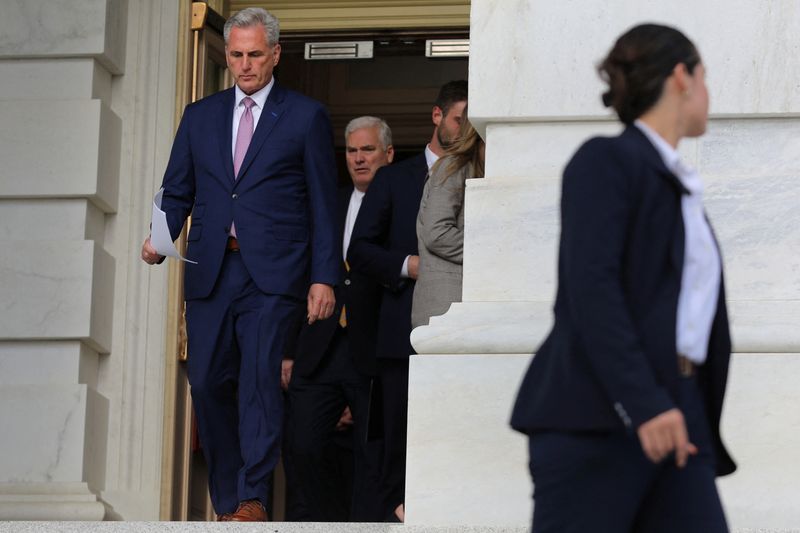WASHINGTON (Reuters) - U.S. House of Representatives Speaker Kevin McCarthy unveiled a bill this week that would pair $4.5 trillion in spending cuts with a $1.5 trillion increase in the federal debt limit, laying out an opening position in what is likely to be a tense partisan debate over government borrowing.
Here is a summary of his plan:
DEBT-CEILING INCREASE
McCarthy's bill would suspend the nation's borrowing limit, currently $31.4 trillion, through March 31, 2024 or until it increases by another $1.5 trillion -- whichever comes first. At that point, Congress would have to address the issue again, as the 2024 presidential campaign heats up.
SPENDING RESTRAINTS
The plan would cut a wide swath of government spending to last year's levels, a decrease of about 9%. From that point, growth would be capped at 1% annually over the next 10 years.
That would save roughly $3.2 trillion, compared with current projections.
It is not clear how the spending caps would affect specific government operations, from air traffic control to housing to the military.
Republicans are likely to press for deeper cuts to programs like environmental protection to ensure that Pentagon spending can continue to grow, but Democrats are sure to resist.
The caps would reduce spending in real terms as they would not keep up with projected inflation and population growth.
The caps would not apply to benefit programs like Social Security and Medicare, which are projected to grow dramatically as the population ages.
CLAW BACK UNSPENT COVID-19 FUNDS
The plan would cancel the remaining funds from the $5.2 trillion Congress approved between 2020 and 2022 to fight COVID-19. According to the White House, the remaining money amounted to less than $80 billion in January and is likely lower now.
Most of that money is earmarked for troubled union pension funds, veterans' health care and medical research.
CANCEL STUDENT DEBT RELIEF
It would cancel Democratic President Joe Biden's effort to cancel roughly $400 billion in student debt, which Republicans have portrayed as unfair to those who did not go to college or already paid off their debts. The Supreme Court is expected to rule before July whether that plan is legal.
IRS BUDGET
The plan targets an $80 billion investment plan for the Internal Revenue Service, which the tax-collecting agency will use to hire more employees and deploy new technology.
This would actually worsen the government's budget woes, as it would sacrifice the increased revenue that the IRS would generate through better tax enforcement -- a figure that the nonpartisan Congressional Budget Office puts at $204 billion.
REPEAL GREEN TAX INCENTIVES
It would repeal incentives for renewable energy, electric vehicles and other climate-friendly technology that Democrats passed last year as part of the Inflation Reduction Act. It does not target corporate tax increases, drug-pricing restraints or other aspects of that law.
TIGHTEN WORK REQUIREMENTS
The plan would stiffen work requirements for participants in some antipoverty programs.
Childless adults up to 56 who get health insurance through Medicaid, which covers low-income people, would have to work at least 80 hours a month or participate in job training or community service.
Likewise, childless adults up to 56 years old who receive food assistance through the SNAP program would lose benefits after three months if they could not prove they were working at least 20 hours a week or participating in a job training program. Those work requirements currently apply to those up to 50 years old.
INCREASED AUTHORITY OVER REGULATIONS
It would give Congress greater power to review new rules put forward by the executive branch.

MORE INCENTIVES FOR OIL AND GAS
McCarthy's package includes a sweeping fossil-fuel bill that passed the Republican-controlled House in March but has stalled in the Democratic-controlled Senate.